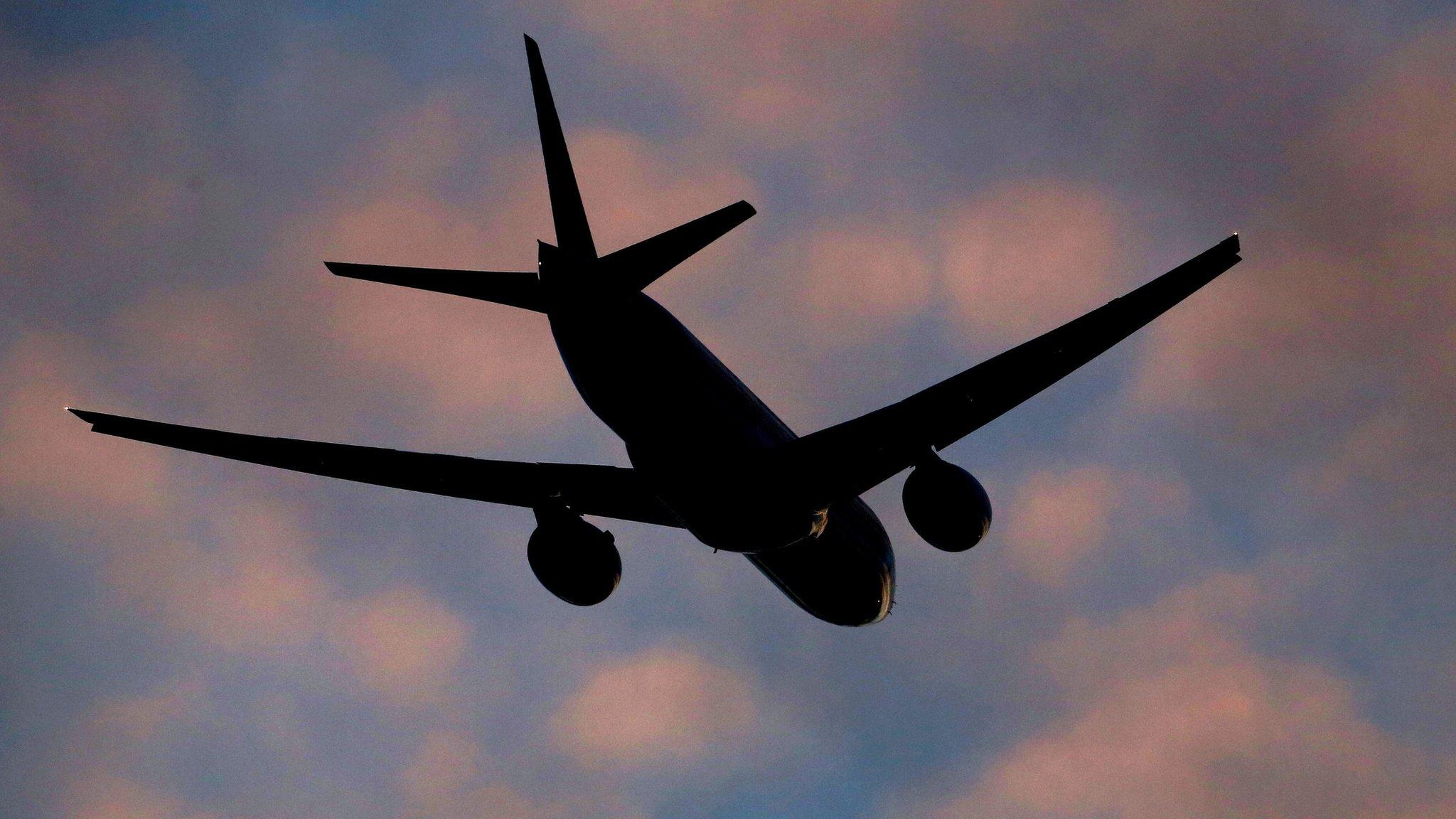Laser pointers: The pocket money gadget that could cause blindness
- Published

A green laser is shone at Chelsea's Mykhailo Mudryk during a Premier League match against Arsenal in May
There has been a "disturbing" rise in laser attacks on emergency workers, an air ambulance charity said this week.
In one of a string of recent incidents, a Yorkshire Air Ambulance (YAA) crew member suffered a burnt cornea after a laser pointer was shone at his helicopter as it flew at 1,500ft.
Paramedics, firefighters and police officers have previously been injured by similar devices.
After YAA said it had been left "searching for answers" over the "very real threat," BBC News looks at how dangerous the pocket-sized devices can be.
What is a laser pointer?
Laser pointers are handheld and battery-powered gadgets which emit a beam of coloured light - usually red, green or blue.
They have been used for decades by teachers and lecturers for highlighting points during presentations, and, in recent years, have also been marketed as toys - typically in the shape of a pen.
The strength of these devices varies widely.
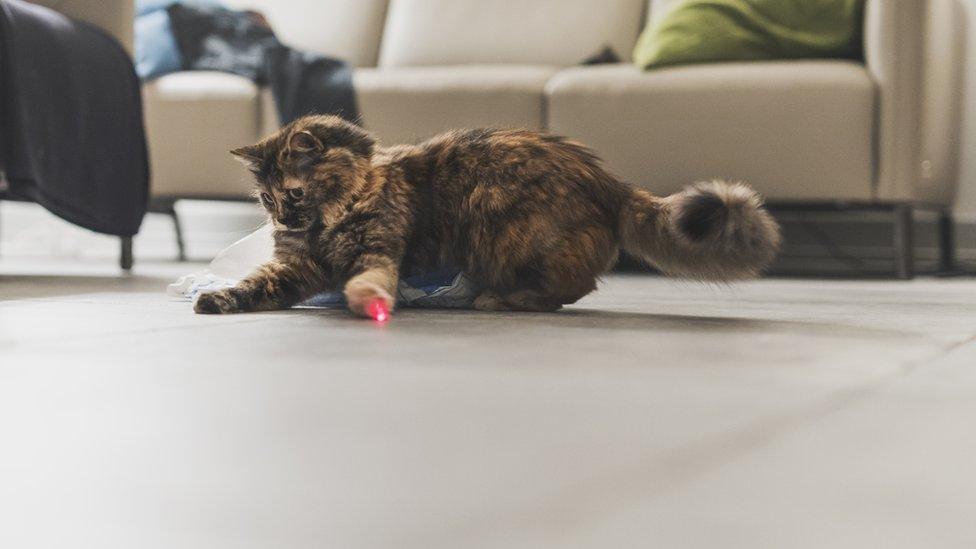
Some laser pens are sold as toys for cats
Most shop-bought laser pens - particularly those which emit red light - are relatively weak and pose little risk to health. However, more powerful devices are readily available online.
Devices which emit green light have the potential to be especially harmful because the human eye is more sensitive to the colour.
However, red and particularly blue lasers can in practice be more dangerous as the eye is less sensitive to the colours, meaning a person may not blink or turn away from the light as quickly.
What are the rules on using and selling them?
It is legal to sell and own laser pens in the UK.
According to Public Health England (PHE) guidelines, devices sold to the public should have a maximum power output of one milliwatt (mW) - one thousandth of a watt.
But PHE said a "significant proportion" of products on the market were stronger than that and many bought online or overseas were incorrectly labelled as weaker than they really were.
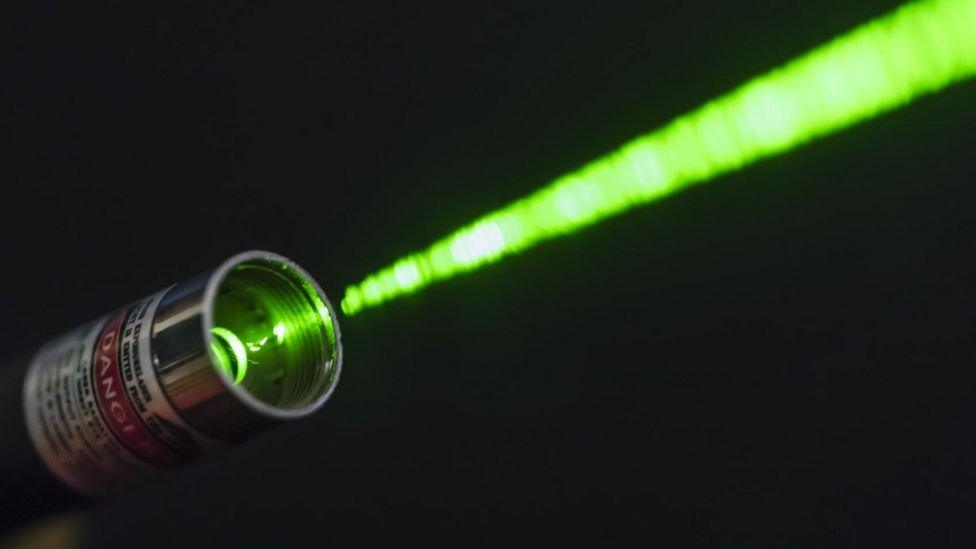
Many pilots have complained of laser interference at night
Several websites which distribute to the UK sell laser devices with claimed power outputs of 2,000mW for as little as £20.
It is a criminal offence to shine a laser at moving vehicles.
Under new laws introduced in 2018, anyone caught dazzling a driver or pilot with a laser faces up to five years in prison and an unlimited fine.
How are laser pens being misused?
Reports of pilots and other air crew being targeted with lasers are common.
The UK's Civil Aviation Authority recorded 536 laser incidents in 2021, up by nearly 10% on the previous year - though down significantly from 1,912 in 2011.
YAA said its crews had been targeted with lasers in four separate incidents this month - the latest coming as a helicopter returned Leeds General Infirmary on Tuesday night.
It warned such incidents had been a recurring problem in recent years across all emergency services.
Two men were arrested after a police helicopter pilot was targeted with a laser pen in South Shields on Monday.
In January, a police helicopter came under "constant attack" with a laser for 40 minutes as officers attempted to a respond to a car crash in Sheffield.
A man was later sentenced to a suspended jail term and claimed he had been attempting to contact aliens.
But it is not just aircraft crews who have been targeted.
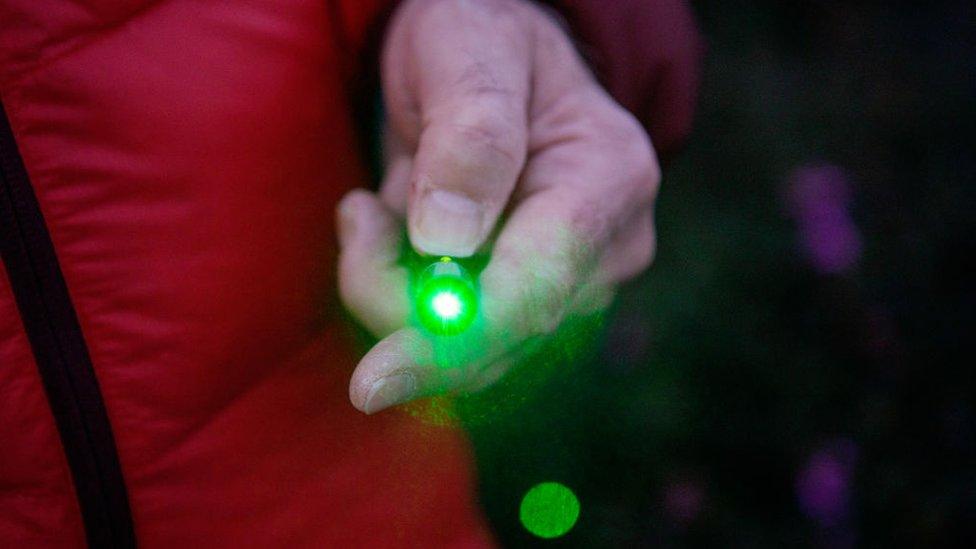
Powerful laser devices can cause permanent vision problems
Last year teenagers shone lasers at firefighters' eyes as they battled blazes in Cheshire and a paramedic was taken to hospital after being targeted while responding to a life-threatening emergency in Carlisle.
In 2017, a lifeboat crew in Kent said they had been hampered during a rescue operation by a "blinding green light" being shone at their boat.
Fans at professional football matches have also targeted players with lasers.
England's FA was fined by Uefa after a laser pointer was directed at Denmark keeper Kasper Schmeichel as Harry Kane prepared to take a crucial extra-time penalty during the Euro 2020 semi-final at Wembley.
However, the most common victims of laser pens may be users themselves.
Badrul Hussain, consultant ophthalmic surgeon at Moorfields Eye Hospital in London, told the BBC he sees "a handful" of injuries caused by laser pens each year - most often children and young people who had been playing with the devices.
He said laser pointers were "not 'toys' and should not be treated as such".
'My eye went blurry - I lost vision'
Alex Clark, a technical crew member for YAA, suffered a serious eye injury when a laser device was shone in his eye on Friday night.
The crew's helicopter was flying at 1,500ft over Bradford at the time.
Mr Clark told the BBC: "I had the night-vision goggles on and when I looked down the green laser went straight in to the right side of the tube.
"At the time, my eye kind of went blurry - I lost vision for about 30 seconds to a minute. Luckily we managed to land on the job and carry on."
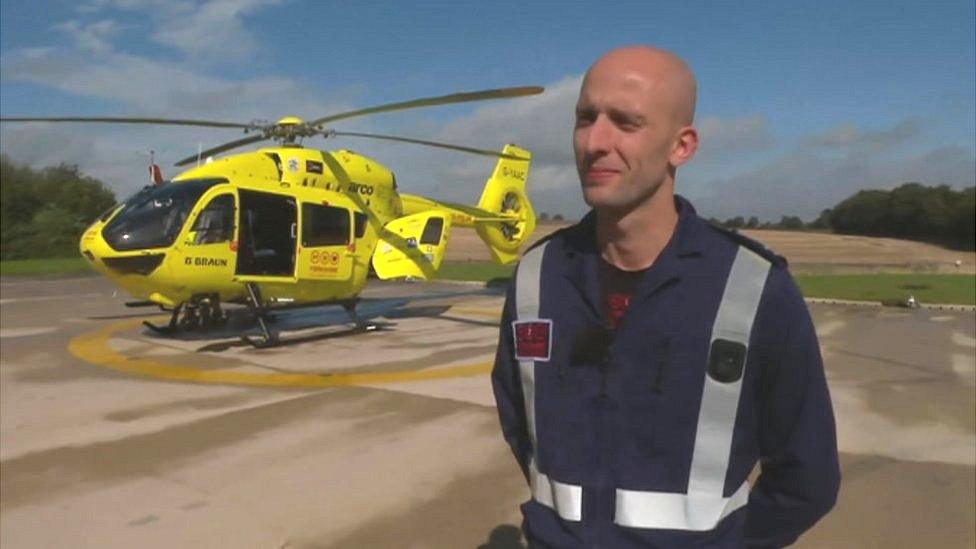
Alex Clark said he could not see for up to a minute after being targeted with a laser at 1,500ft
Doctors told Mr Clark he had suffered a burnt cornea, which should heal within a few days.
But he said such incidents risked preventing YAA - which provides rapid life-saving care in emergencies - getting to patients or transporting them to hospital.
In 2016 an eight-year-old from Hertfordshire damaged his retina by looking into a laser pen he bought from a school fair for just a split second.
Jonny told the BBC: "I wanted to see how bright it was so I shone it in my eye for about quarter of second, not even that, and then there was this huge blur in my eye.
"For three days, until I told my mum, I couldn't read because there was this block stopping me from reading or seeing things properly."
The youngster was taken to Moorfields Eye Hospital, where doctors told him his glasses may have saved his eye by deflecting the laser's light, his mother said.
What harm can they cause?
In the most serious cases, powerful laser devices can cause vision problems or permanent blindness.
Mr Hussain said a potent beam of light could trigger thermal or photochemical reactions which inflict lasting damage on the retina - the nerves at the back of the eye which detect light.
"If this happens, vision can be permanently affected," he added.
PHE says powerful lasers "can present a hazard over considerable distances, often many kilometres".
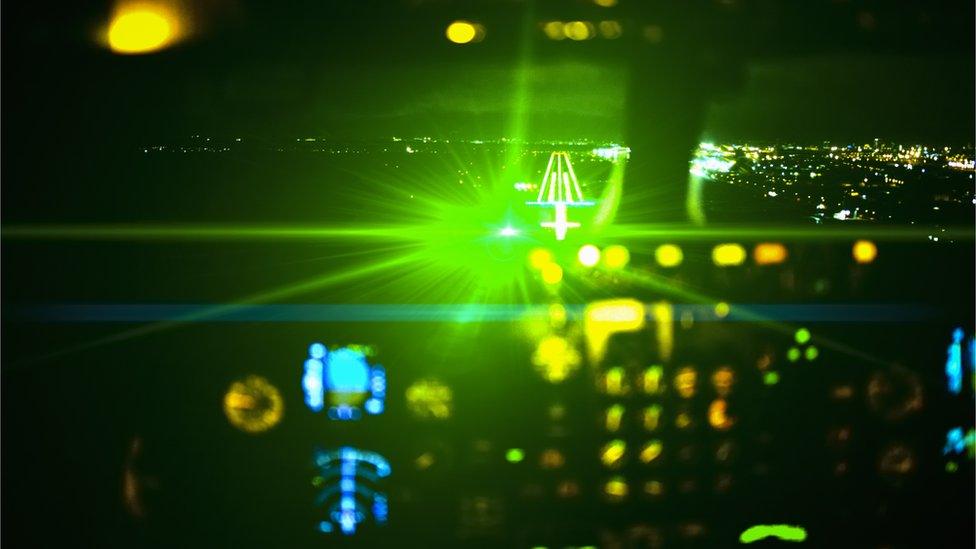
Laser pen beams can travel many kilometres
Less powerful laser pointers can cause temporary blurring of vision but are very unlikely to directly cause serious injury.
However, authorities have warned there could be "catastrophic consequences" of laser being shone at pilots.
Glenn Bradley, the CAA's head of flight operations, said directing lasers at aircraft was "extremely dangerous and irresponsible".
He added: "In the case of the Yorkshire Air Ambulance, this could prevent people receiving vital medical assistance, as well as endangering the aircraft and crew."
YAA said lasers being directed at its helicopters disrupted its crews' efforts to save lives and could even force them to avoid certain areas.
Owen McTeggert, YAA's chief pilot, said: "If we can't see where we're going at night, the dangers that come with that are unthinkable."

Follow BBC Yorkshire on Facebook, external, X (formerly Twitter), external and Instagram, external. Send your story ideas to yorkslincs.news@bbc.co.uk, external.
Related topics
- Published26 September 2023
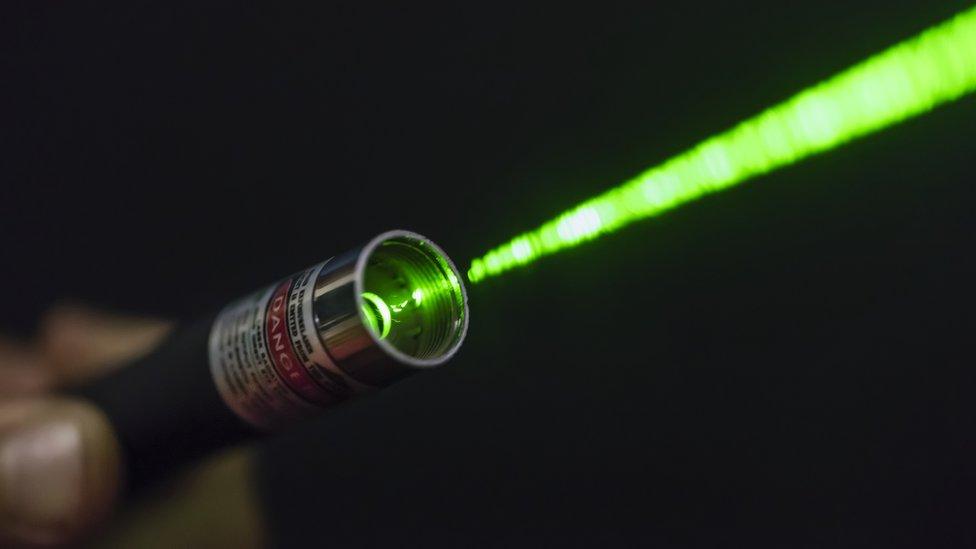
- Published20 December 2017
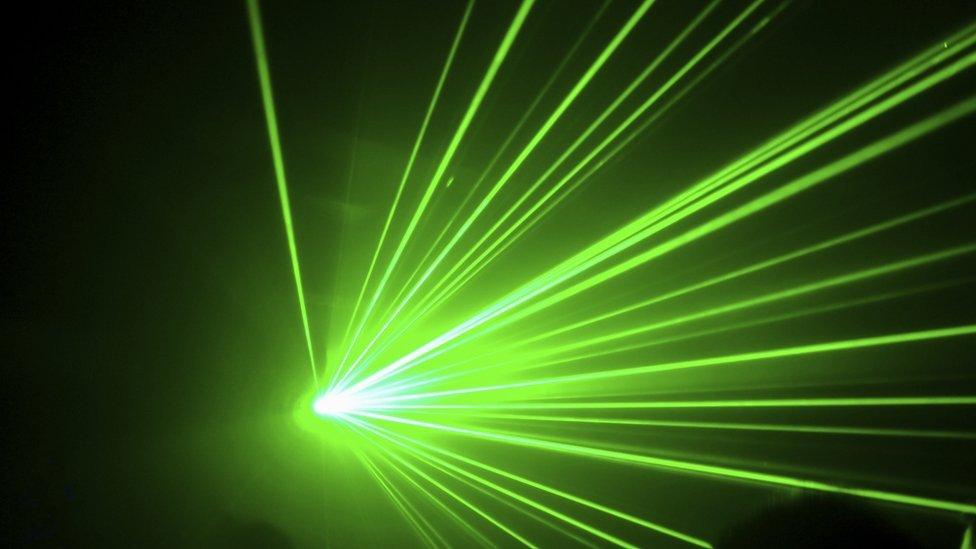
- Published17 May 2023

- Published15 February 2016
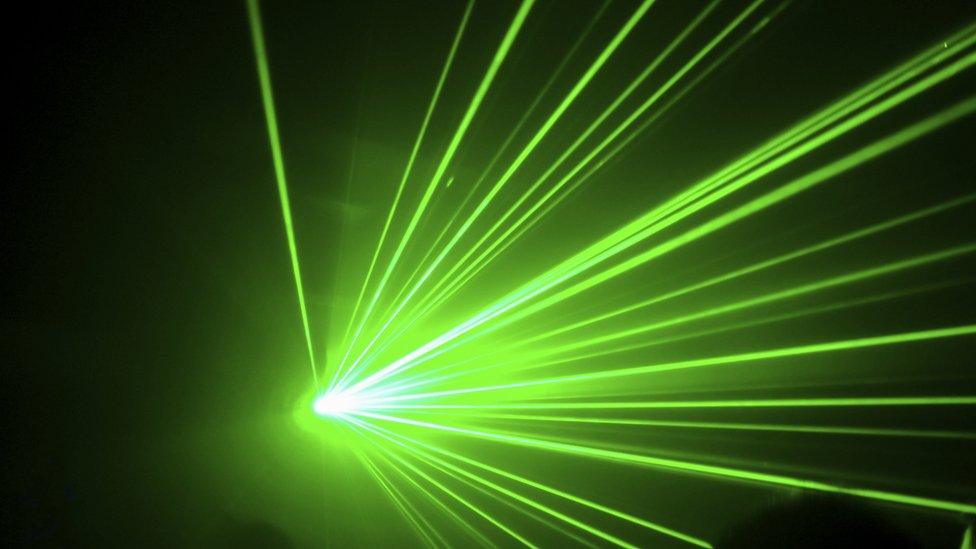
- Published5 February 2017
